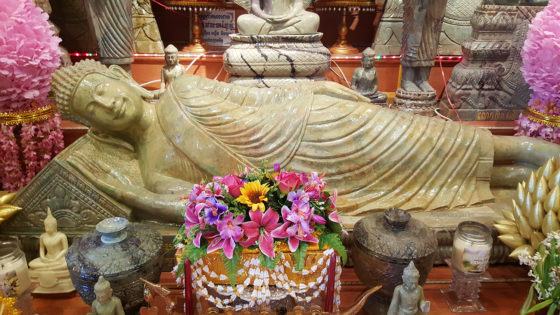Verse 36: The mind is very difficult to see, very delicate and subtle; it moves and lands wherever it pleases. The wise one should guard his mind, for a guarded mind brings happiness.
While residing at the Jetavana monastery, the Buddha uttered Verse (36) of this book, with reference to a young disgruntled bhikkhu who was the son of a banker.
Once, there lived in Savatthi, the son of a banker. This young man asked the bhikkhu, who used to come to his house for alms, what he should do to be liberated from the ills of life. The bhikkhu instructed him to divide his property into three parts; one part to do business with, one part to support the family and one part to give in charity. He did as he was told and again asked what else should be done next. So he was further instructed; first to take refuge in the Three Gems* and to observe the five precepts; secondly, to observe the ten precepts; and thirdly, to renounce the world and enter the Buddhist religious Order. The young man complied with all these instructions and became a bhikkhu.
As a bhikkhu, he was taught the Abhidhamma** by one teacher and the Vinaya by another. Being taught in this way, he felt that there was too much to be learnt, that the disciplinary rules were too strict and too many, so much so that there was not enough freedom even to stretch out one’s hands. He thought that it might be better to return to the life of a householder. As a result of doubt and discontent, he became unhappy and neglected his duties; he also became thin and emaciated. When the Buddha came to know about this, he said to the young bhikkhu, “if you can only control your mind, you will have nothing more to control; so guard your own mind.”
Then the Buddha spoke in verse as follows:
Verse 36: The mind is very difficult to see, very delicate and subtle; it moves and lands wherever it pleases. The wise one should guard his mind, for a guarded mind brings happiness.
At the end of the discourse, the young bhikkhu and many others attained arahatship.
- Three Gems: The Three Gems are the Buddha, the Dhamma and the Samgha, (i.e., the Buddha, the Teaching of the Buddha, and the Buddhist religious Order).
** Abhidhamma: the third great division of the Pitaka comprising the Buddha’s philosophical exposition of ultimate realities.
Dhammapada Verse 36
Ukkanthitabhikkhu Vatthu
Sududdasam sunipunam
yatthakamanipatinam
cittam rakketha medhavi
cittam guttam sukhavaham.
Source: Tipitaka








Add a comment